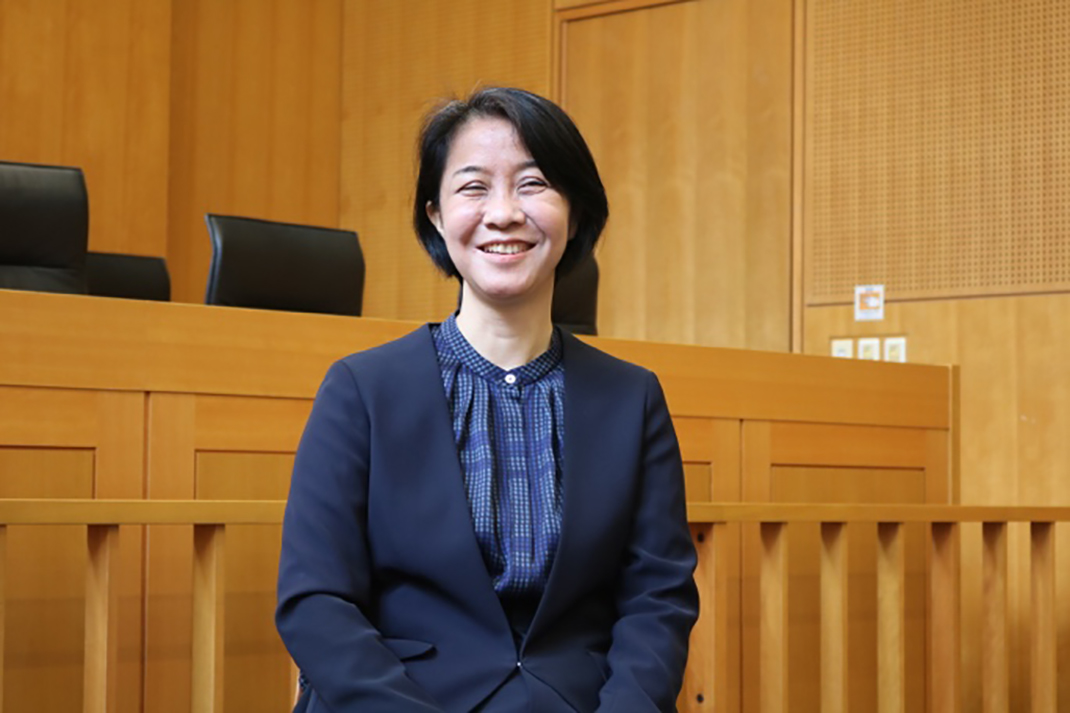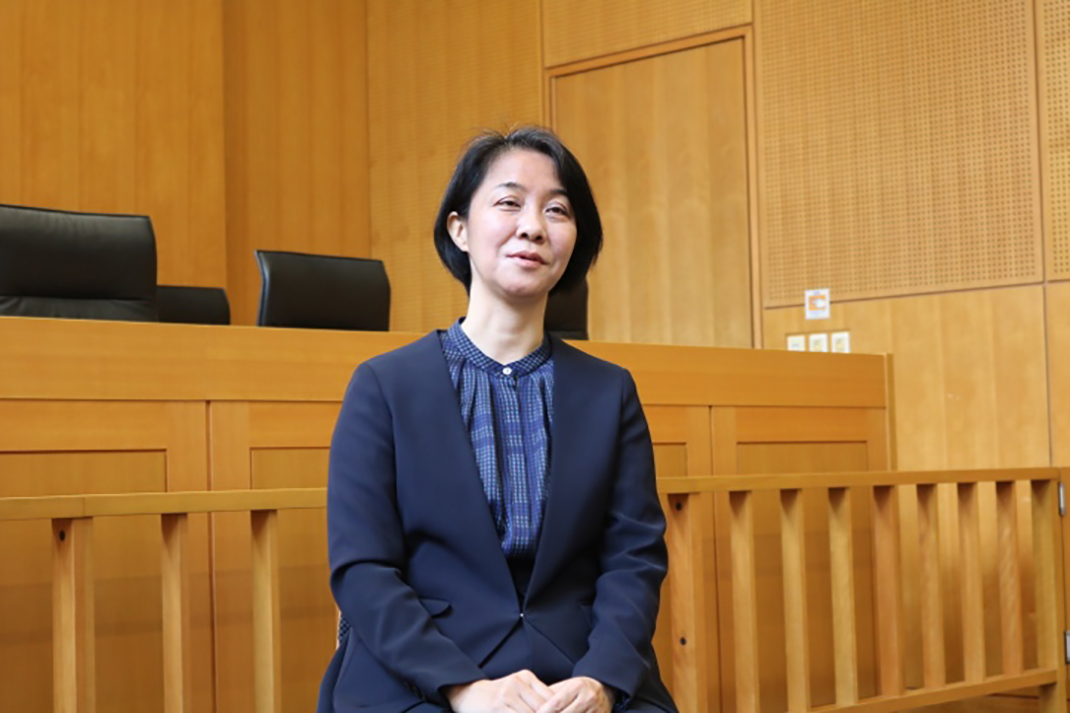The Global Program under the Department of International Business Law, College of Law and Politics
Departments and Programs
Why study in the Global Program?
Working to communicate Japanese law to the wider world and to learn differences between laws of countries to train “legal common sense”

The legal system of any country has a “domestic” quality to it—each country has its own laws that are written in the national language and apply within that country. The decision to translate Japanese law into English and to teach it in English is quite unique at the undergraduate level. And that is precisely why we are hoping that this Global Program will enable us to contribute as a center for communicating Japanese legal studies to the wider world. This can be useful not only for Japanese students who wish to work internationally with legal knowledge, but also students from other countries, particularly Southeast Asia. Since Japan gives advice and assistance to countries in Southeast Asia to develop their legal systems, you can find laws of those countries that are originated from the Japanese counterparts. In fact, several members of the faculty have worked in countries like Vietnam and Laos. However, the field of Japanese law has tended to be somewhat cut off from the wider world because of the Japanese language barrier, and communicating knowledge of Japanese law and sharing it with colleagues in other countries has been a challenge. Learning Japanese law, therefore, can serve to help you understand your own country’s law.
The same can be said to students from Western countries, as well, because the law in Japan today is built on the Western legal systems that were introduced to the country in the late 19th century. As a result, there is surprisingly a lot of commonalities between Japanese law and laws of Western countries, such as Germany, France, the US, and the UK.
In addition, while the law in Japan today is built on the Western legal systems, Japanese law has developed along its own since then by learning and digesting laws and legal theories developed in various Western countries, such as Germany, France, the UK, and the US. There have been many Japanese legal scholars who study laws of other countries, such as those four countries mentioned above, China, Korea, Australia, Switzerland, Italy, Scandinavian countries, Russia, Canada and Brazil. In fact, almost all legal scholars in Japan have been conducting comparative legal studies (i.e., comparing Japanese laws with laws of other countries) in order to learn new legal approaches to social issues developed in different countries and get inspirations from them to develop Japanese law. Owing to the long history of comparative legal studies, we understand the importance of examining not only Japanese law but also laws of other countries from comparative perspectives. Although the world of comparative legal studies is difficult to explain in a few words, one can easily find it interesting to learn different ways of solving one type of dispute. For instance, how does Japanese law solve a case of fraud? How does the US law solve the same case? How the Japanese and US laws are different? Why are they different? Which law works better in what situations, and why? Through comparative legal studies, you can train “legal common sense” that is applicable internationally, because you can learn “sense of justice” embedded in laws of different countries.
The same can be said to students from Western countries, as well, because the law in Japan today is built on the Western legal systems that were introduced to the country in the late 19th century. As a result, there is surprisingly a lot of commonalities between Japanese law and laws of Western countries, such as Germany, France, the US, and the UK.
In addition, while the law in Japan today is built on the Western legal systems, Japanese law has developed along its own since then by learning and digesting laws and legal theories developed in various Western countries, such as Germany, France, the UK, and the US. There have been many Japanese legal scholars who study laws of other countries, such as those four countries mentioned above, China, Korea, Australia, Switzerland, Italy, Scandinavian countries, Russia, Canada and Brazil. In fact, almost all legal scholars in Japan have been conducting comparative legal studies (i.e., comparing Japanese laws with laws of other countries) in order to learn new legal approaches to social issues developed in different countries and get inspirations from them to develop Japanese law. Owing to the long history of comparative legal studies, we understand the importance of examining not only Japanese law but also laws of other countries from comparative perspectives. Although the world of comparative legal studies is difficult to explain in a few words, one can easily find it interesting to learn different ways of solving one type of dispute. For instance, how does Japanese law solve a case of fraud? How does the US law solve the same case? How the Japanese and US laws are different? Why are they different? Which law works better in what situations, and why? Through comparative legal studies, you can train “legal common sense” that is applicable internationally, because you can learn “sense of justice” embedded in laws of different countries.
Learning experiences that help students to understand the nature of a conflict and find solutions

Another course offered as part of the Global Program is called Negotiation Basics. Students work in teams to research a given subject, then roleplay negotiations. The course is very popular with students. Negotiating is a vital skill not only in business, but in all kinds of situations in daily life. Say the branches of a tree in your neighbor’s garden start to come down on your side of the fence and are encroaching on your property. Even in a neighborhood dispute like this, there are many different angles from which to approach the problem. Are you entitled to cut the branches as soon as they come onto your property? Who should bear the costs of having the branches cut back? Based on their legal knowledge, students consider a wide range of options and build on this to carry out negotiations—I think these are learning experiences that students can only get in a law department.
This goes beyond negotiations. In studying law, it’s important to consider the background to the disagreements that arise in daily life. Once we understand the nature of the conflict, we can work to find common ground that can lead to a solution. In the Global Program, we examine many of the legal problems that can arise in international business. These issues go beyond business dealings in a limited sense to incorporate a wide variety of fields, such as the natural environment and labor disputes. The opportunity for students to address these issues in English during their undergraduate years will put them in good stead later if they go on to work for global companies or international institutions or go on to graduate studies at universities overseas.
A summary of the interview article about the Global Program in the St. Paul’s Alumni News Papers No. 458, May 2022.
This goes beyond negotiations. In studying law, it’s important to consider the background to the disagreements that arise in daily life. Once we understand the nature of the conflict, we can work to find common ground that can lead to a solution. In the Global Program, we examine many of the legal problems that can arise in international business. These issues go beyond business dealings in a limited sense to incorporate a wide variety of fields, such as the natural environment and labor disputes. The opportunity for students to address these issues in English during their undergraduate years will put them in good stead later if they go on to work for global companies or international institutions or go on to graduate studies at universities overseas.
A summary of the interview article about the Global Program in the St. Paul’s Alumni News Papers No. 458, May 2022.
